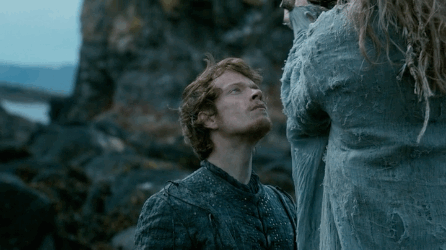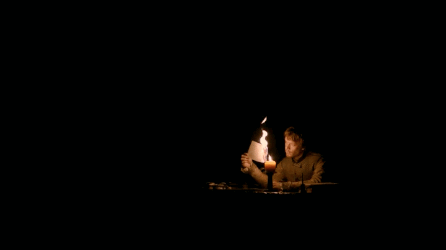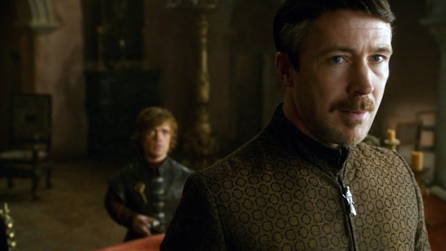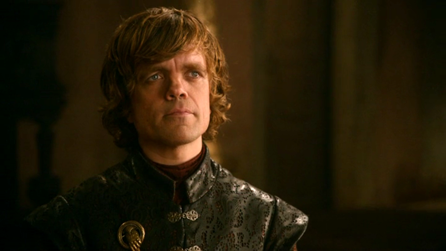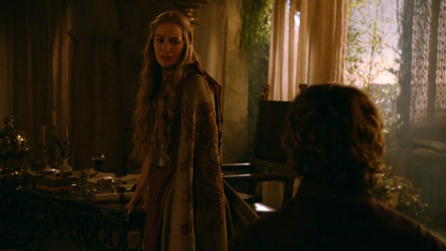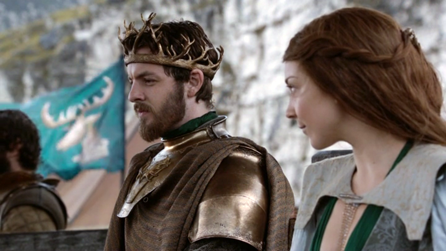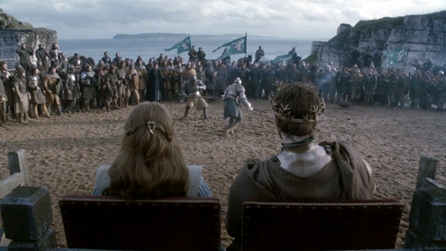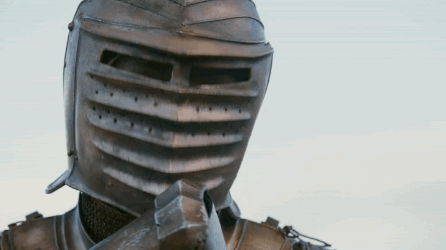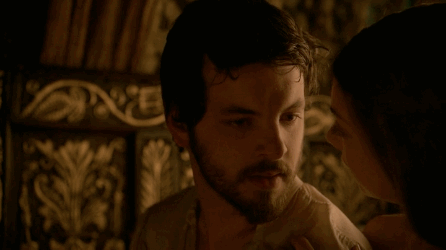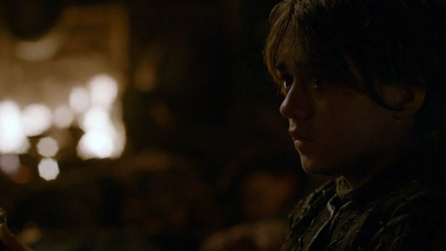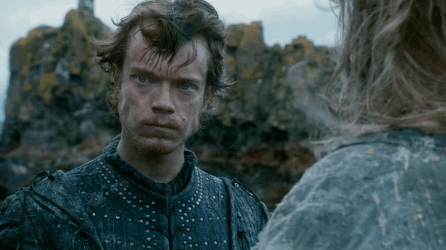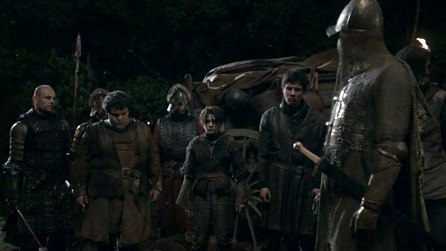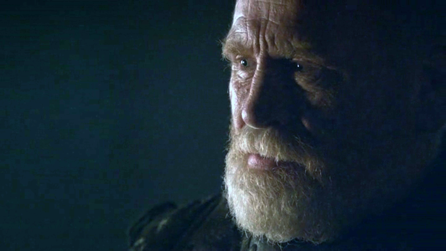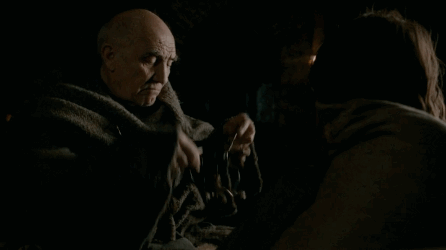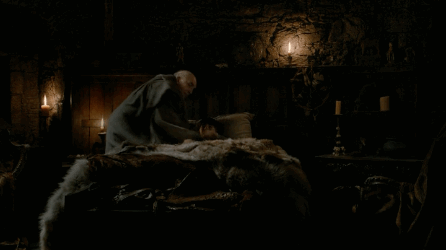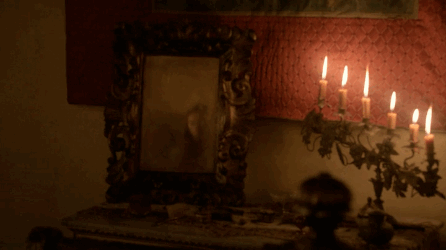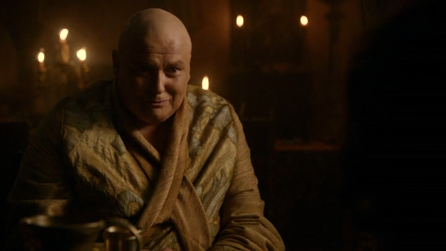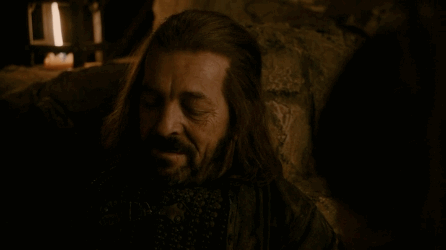THIS WEEK on Game of Thrones: “What is Dead May Never Die”
“What is Dead May Never Die” is the pledge of the men of the Iron Islands. When they undergo this ‘baptism’ by saltwater in their adolescence, they are ‘drowned’ in the waters in homage to the old tradition — Ironmen were literally drowned, then resuscitated, and having suffered that little ‘death’, they style themselves as dead men, unable to be killed on the battlefield.
Theon Greyjoy bathed in saltwaters at the climax of Sunday’s episode of Game of Thrones, and made the choice to betray the North, and his foster brother, Robb Stark.
Betrayal was at the heart of Sunday’s storytelling; brothers betraying sisters, hands betraying minds, initiates betraying promises, monarchs betraying oaths, and one man even betraying his own deepest desires.
Let’s get the scene of the night out of the way first: Tyrion’s 1-on-3 master class in deception. Book readers were particularly interested in seeing this chapter (‘One, two, three’) come to life; it’s a sterling example of adaptation — it’s quite different from Tyrion’s three-pronged approach in A Clash of Kings on the various members of the Small Council, but maintains the essence of the scene while taking advantage of what the new format can do.
Tell me you didn’t perk up when the camera panned back to reveal Varys in Grand Maester Pycelle’s place. ‘Don’t tell the Queen’ he says. ‘Don’t tell the queen’ to each member of the council in turn. ‘And remember, don’t tell the Queen’. The repetition is a strong hook; the episode’s telling us what to watch for, and exactly how the complex story threads are being weaved so that we can keep up.
Tyrion knows that when one of his three stories makes its way to Cersei — as it does a few scenes later — he’ll know who he can trust on the Council, get them out of the way, and forge a new bond with the others in the process. Littlefinger has been entrusted by Tyrion with a new task and greater power, and Varys has new respect for the little man ‘that casts a great shadow’. And Pycelle, now beardless and whoreless, is comfortably out of the way. All of Tyrion’s pieces are moving to his strings perfectly.
Tyrion expected, even orchestrated the council so as to betray him, in order to betray his sister. Smart little man.
Cersei is shattered by the events, and Lena Headey gets a great moment in a season that’s been increasingly brutal to her character. Cersei’s lost her lover, her brother, and as of two weeks ago, an ill-timed slap meant she’s pretty much lost her son to his own wickedness. To have news that her only daughter is being ripped away from her as well is too draining, and she doesn’t know how to deal with it. Worse still, she’s still emotionally reeling from having been ‘shipped off’ to marry Robert Baratheon for the sake of political alliance. It’s too much to bear to see her daughter be used the same way.
Political marriage, a brokerage of hearts to win armies and peoples — we saw it with Danaerys and Drogo (the story of the far East is absent this week, mercifully allowing the stories in Westeros to stretch out and breathe). And now, we get to see it again in an entirely different light with the youngest Baratheon, our good, queer King Renly.
It’s a miracle that the fan community is still upset that some characters are being cut or condensed from the books; there are still scores of them to deal with, and new ones appearing all the time. The court of the young king in the south is a confusing scene for viewers, so we have to set the stage before we get to the thematic core and significance of Renly’s scenes.
Incoming boring, but necessary layout for the wars of Westeros:
Renly appears to be the strongest contender for the Iron Throne, where numbers are considered. He has 100,000 men under his command, by virtue of an alliance with the Tyrells of Highgarden (an alliance brokered by his marriage to the episode’s first standout new character, Margaery Tyrell).
The Lannisters reportedly had less than half that number, and Robb Stark in the north has 20,000 or less to work with, despite his string of victories. Stannis is massing ships and troops at Dragonstone, but we know he’s undermanned, words straight from his own lips. The Greyjoys about to wage their own war in the north — concern themselves primarily with seapower, and likely don’t have the manpower necessary to contend with the other Kings. And Dany…well, she’s got about 50 starving slaves, a small stable of horses (and camels? Who the fuck knows), and three, baby dragons.
There’s the stage. But the prime military contender is busy amusing himself!
The scene that welcomes us to Renly’s court is queer in itself. The king is holding games to rile up and entertain his gathered people, instead of actively preparing for war further north, something Cat Stark rightly accuses him of by scene’s end. The camera concurs with this assessment; the scene starts up close on the contest of knights, then leaps out to see Renly and Queen Margaery looking on, then jumps out further to give us the establishing shot of the grounds, before suddenly jumping back in again. It’s a total reversal of the normal shot sequence we get when being introduced to a new locale, and helps emphasize Cat’s point; Renly’s focus is narrow, and he and his ‘knights of summer’ may not be able to comprehend the true immensity of the war that awaits them.
A beast of a knight takes down the much-lauded Loras Tyrell — Margaery’s brother and Renly’s secret lover. We know this warrior is serious business. And then, our senses are betrayed. This 6-foot-4 behemoth, is a woman. Brienne, of Tarth, the newest member of Renly’s kingsguard.
Listen to the crowd in their murmur of surprise. Watch with delight at Loras’ resentment of his lover as Renly awards membership in his guard to this newcomer, devaluing Loras’ place as the first of Renly’s knights, a position he no doubt earned over time (and with a great deal of oral stimulation; without modern conditioners, Loras’ hair needs something else to get those curls their peerless bounce and shine). Even Renly’s little strumpet of a knight feels betrayed, and he intones as much when the King is tugging at his breeches in bed later.
Only Renly is betraying someone as well: himself, and his people. The immense union of the Baratheons and Highgarden needs a child to consummate and consecrate the alliance and function as Renly’s heir. Only how’s the man ever going to get a woody when only another woody would give him wood?
Margaery’s too smart for this. She, Brienne and Arya (all the ladies) are the faces, hearts and minds that we can trust in this episode, free of the fear of betrayal. Arya is too innocent, Brienne too honorable, and Margaery, at least for now, appears ready to take on her husband-king’s enormous secret in full trust, completely aware of the part she needs to play as the woman on the arm of the largest political and physical force in Westeros.
(I’d love to see debate on the amount of trust Margaery really engenders in this story, especially with only one real character-rich scene so far — albeit a tremendously rich one. The girl is rich in cinematic power and presence, and she’s a bizarre and vital new subject to study with regards to the show’s hallmark ‘sexposition’. Don’t worry; I don’t go for the ladies as such, and even my eyes were all over her body in that scene, and that was the point.)
Least questionable in matters of trust is Arya Stark — she pulls a fast one on the gold-cloaks, impeding a betrayal of Gendry amongst the other Night Watch recruits. In one deft stroke, she rather instantly strengthens and affirms the bond that’s been quickly growing between her and Robert’s chief bastard. We, and Gendry, can’t help but trust her — almost because Arya is too trusting herself. They’ve shared their closest, most incendiary secrets with each other, and are now both being hunted for them.
This theme is truly no accident this week; everyone’s breaking the rules and risking everything they’re supposed to stand for, so as to do right by their own hearts and consciences. Jon is circumventing the orders of his Lord Commander to bring attention to Craster’s crimes; Sam is betraying the Black by associating with a woman, plotting a future with her and making a promise to her he may never be able to keep; and Theon goes full turncloak, trying to correct one betrayal with another — even now, it’s hard to tell if he’s really with the Greyjoys; that stare imparts too much doubt to handle. The lone tear falling down his left cheek amidst the stream of saltwater on his face confirms it; he’s still conflicted — who is he going to betray next?
This week’s random ruminations and points to consider:
The Hard Facts — Dis Cast be Big!
Game of Thrones has a wisdom with regards to its scene breakdown. The show is merciful in deciding on which characters to feature, and when. The premiere mandated that every story in Westeros and Essos be revisited. But now, well into the major arteries of the season, and fast approaching its heart, we get to delve with an artful hand into each character’s story, unrushed, uncluttered, with ample room to breathe.
Case in point, the extended time we spend with Arya and company at the end. So much is happening in the world of this show, and yet, we still get two scenes back to back for Arya’s story, enriching our time with her (as opposed to one scene at the start of the hour and one at the end, for example), and better still, we get to focus on her fears. The fears of a little girl, surrounded by war, a scene unencumbered by the presence of too many surrounding scenes.
And all it took was one hard decision; we don’t need to see Joffrey, or Jaime, or Stannis, or Robb, or Dany this week. Let’s let who we have this week breathe, stretch out, expand and grow deeply. This promise means to me that we can rightly hope and expect the time we spend with all of those characters later on to be just as rich.
Note too how Myrcella is given a line or two to reintroduce her at dinner before she becomes the subject of Tyrion’s various power plays later on. It’s a good way to kill several birds with one stone and use the incomprehensibly large cast to help guide your audience through your story.
What are the Gods, and what can ‘god’ mean?
One of Mormont’s lines in the scene at Craster’s Keep stuck out brilliantly for me. We learn with Jon that Mormont knows about Craster’s offerings to the powers that be in the North — presumably the White Walkers. Mormont shakes Jon to his senses, and says of Craster and the free folk: “The Wildlings serve crueler gods than you or I”.
What are the fun and thought-provoking takeaways from such a line?
Face-value: this is the story re-acknowledging the presence of many gods and supernatural powers in the world. The Old Gods of the First Men of Westeros, the New Gods — the Seven of the South, Melisandre’s Red Lord of Light from the East, and now, perhaps even more gods that hold sway north of the Wall.
I prefer to think of Mormont’s words in another way altogether: as a subtle redefinition of what a man’s god can be in this world. Here, for the wildlings of the North, god is a warden, a source of punishment, the natural force of an ever-present winter and an ominous force of threat and darkness; the White Walkers. The free folk pay tribute to that god, that set of circumstances, by finding means of truce with that ‘god’. Craster’s sacrificing his boys to the cold powers in the woods around his Keep. That’s his god. That’s the force that he has to contend with every day in order to survive.
Is that what Mormont meant? Is this how Craster says his prayers?
Bold, Complex Fantasy — it’s Still Here
This show is truly unafraid of dropping a Westeros Wiki’s worth of information in every episode. It might seriously come back to bite it in the ass when the burden of the innumerable names, places, histories and events collapse on a viewer unable or unwilling to commit to the story. Until then (assuming it hasn’t happened for you already), the deluge of information is still a rich stream to bask in.
Maester Luwin and Bran drop knowledge bombs on each other this week. Bran describes to his maester the wolf-dreams he’s been having, recounting stories from Old Nan about people who were able to work within the minds of their animals on command. Luwin responds by addressing the chain of rings he and all the Maesters have been wearing, describing that the small link of Valyrian Steel he bears signifies his mastery of study in ‘the Higher Mysteries’. That might be Westeros’ fancy name for magic, or the supernatural. Luwin definitely uses the word ‘spells’, and addresses the failure of present-day Westeros to know and wield power over these ‘mysteries’. But of course, when he discounts the existence of the dragons in the present, we know that he isn’t a source of perfect knowledge for us, and that these ‘magics’ may be as real and present in our story as Dany’s pets are.
Luwin mentions the Children of the Forest, the beings that lived in Westeros before the Andals, New Men, came from the East with new gods. There’s a lot here in the many faiths and histories of Westeros, and HBO isn’t afraid of allowing all that higher fantasy to seep into the story, especially when time is at such a premium in every episode.
What do you all think? Is that a mistake, an error in judgement in television storytelling?
One Gorgeous CG Wolf a Week:
Bran’s dire wolf, Summer, had a marvelous debut (outside the liminal world) — a POV tracking shot, where we see Summer get welcomed into the keep by Hodor, and then some servants turning away in fear and apprehension, and then finally, up onto the bed atop his master. Or are they just one being now? Was Bran in control, or did he just join Summer for the ride in his dream? The repeated use of the overhead angle of Bran in bed throughout the series contrasts with immense strength against the extreme close-up on Summer’s face, staring into his master’s eyes. It’s a great moment.
We’ve seen Grey Wind taunt the Kingslayer, Ghost playfully introducing himself to Gilly, and now Summer looking after Bran. There are three more dire wolves in our story: Sansa’s Lady, put down by her father last year, Arya’s Nymeria, sent off into the wilds a lifetime ago, and Rickon’s Shaggydog, presumably prowling around Winterfell with the youngest, forgotten Stark Child.
Which one might we see next?
The Long-standing Marriage of the Epic and the Mundane
A brief note; Luwin bestows upon Bran a brief history of magic in Westeros at his bedside. And then stops talking. For like, a full ten seconds. He stands up, adjusts Bran’s bedsheets, tucks him back in, swaddles the broken boy, and sits back down in silence. Bran is still fractured and crippled. That isn’t going away, and a lengthy pause to address that circumstance keeps that wound fresh and bloody, even a whole year later.
Dinner in King’s Landing
Before the hurt is doled out on Cersei, she hosts a dinner for her children and their captor-guest, Sansa Stark. The perfect conversation topic comes up, on the innocent lips of Cersei’s youngest child, Tommen: ‘Will Joffrey kill Robb in battle?’ Imagine cracking into a delicious aperitif of oysters and stew while your betrothed’s family chats about your monstrous boy-husband chopping your brother into pieces.
Horrors.
We get fascinating character portraits here: Tommen and Myrcella are shining beacons of innocence and light amidst a family rife with violence, betrayal, evil and bullshit — they might still be salvageable, and better still, worth saving. But who could help them avoid becoming the monsters almost every Lannister has grown up to be?
And Sansa, the eldest Stark girl, is just about ready to shatter. The mask she wears at dinner isn’t even slightly fooling Cersei. And the image Sansa sees in the mirror in her bedroom moments later, the girl she’s become while her family is torn apart in foreign countries, it revolts and confuses her! She has no idea what she’s become, and when Shae arrives to attend to her a beat later, Sansa, teetering on the edge between sanity and tears, reverts to the only persona she can remember inhabiting and mastering; the proper lady. It’s all she can count on for now, all she knows. When Shae undermines the relationship between proper lady and proper handmaid, Sansa falls apart, almost loses whatever grip she has on herself, and demands that Tyrion’s whore conform to the only reality Sansa knows how to work. Brush my fucking hair and damn all the rest.
Varys, and the Riddle of Power
Power will always be the central topic of Game of Thrones. Varys’ riddle and speech are prescient and haunting. A king, a priest and a rich man all bid a sellsword to kill the other men; who lives and who dies? If ever a single sentence and question could embody the entirety of this show and story, that would be it. Tyrion no doubt feels haunted by the riddle, too; he’s just empowered a common sellsword to one of the highest military stations in the world; command of the Gold Cloaks of King’s Landing. If ‘power resides where men believe it resides’, Tyrion has to be hoping that Bronn continues having confidence in him and his power, or he’ll lose Bronn and the confidence of the court and council all at once.
Casting, casting, casting!
Robert Baratheon, black of hair. Stannis Baratheon, black of hair. Renly Baratheon, black of hair. Joffrey Baratheon, golden-head.
The scene from the first season resonates to this day. The show privileges heredity and the visual congruence of family. You are your mother’s daughter, people still say to Sansa. And there is no question that Renly looks like Robert’s brother. The actors playing Loras and Margaery Tyrell look like real siblings. Yara and Balon are cut from the same sullen, riven, hollow cloth.
This shit isn’t easy. Props to the casting department; they’re upholding Martin’s vision of a visual ‘family’ aesthetic remarkably well.
Yoren is a fucking badass, to his last breath
What a great sendoff for a character who could have been completely forgettable. Nevermind the spectacular death, and marvelous last derogatory words toward his crossbow-wielding assailant before slicing open his throat — how about that storytime with Arya? We were almost getting to the point where Arya could find a new confidence with this mentor, such as she had with Jon, then Ned, then Syrio, before each were ripped away in turn. Now she’s been ‘widowed’ again, so to speak, and only has Gendry at her side. On the other hand, as an audience, we have a new villain to loathe in Amory Lorch, the captain that led the charge against the now captive Night’s Watch recruits and killed Yoren; not content to just be a smug shit of an envoy, he has the gall to kill Arya’s helpless companion Lommy with Needle, her own sword.
Join me in hoping the tool gets something of his own cut off soon. Anything.
Foreshadowing up the Ass: Harrenhal
This place has been mentioned often enough, and now it seems we’re finally going there, if the guards in custody of Arya, Gendry and Hot Pie are to be trusted. What’s more, Petyr ‘Littlefinger’ Baelish was just given lordship over Harrenhal and the River-lands by Tyrion, and the place is apparently ‘cursed’. The River-lands are supposed to be home to the Tullys, Catelyn and Lysa’s original family House. Incoming awesome?
Next Week?
Hopefully a return to the characters we’ve spent the longest without: Joffrey, Daenerys (two scenes so far in three episodes!) Stannis, Davos and Robb. Theon and the Greyjoys are massing for attack; I’d expect the spotlight off of them for a bit. Renly and Stannis need to make moves soon to stay relevant. Harrenhal is coming, next week or the week after at most, I’d wager. Arya took the time to help the caged criminals in their entourage free themselves from the fire; Jaqen’s stare lingered on Arya. Something’s brewing.
And it’s about time for some blood, I’d say! Open warfare or small-time violence; the war needs some life and strife shot back into it.
See you all in a week!
Budrickton, First of His Name, Warden of the Actual North (Canada)




